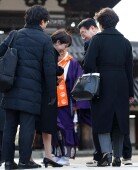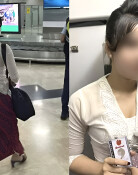First Public Hearing on Capital Relocation in its National Tour
First Public Hearing on Capital Relocation in its National Tour
Posted July. 12, 2004 22:11,
The first meeting of the national tour of public hearings after the announcement of the assessment results in regard to the capital relocation candidate sites was held at the Expo Science Parks International Conference Hall in Daejeon on July 12.
As the first public hearing after the relocation site was confirmed to be Yeongi-gun and Gongju-shi (Janggi-myeon), Chungnam, the hearing was subject to attention-catching because of some changes in its name and contents.
Previously, the New Administrative Capital Construction Promotion Committee announced on July 5 that they will hold the Candidate Site Assessment Result Public Hearing in nine cities nationwide. However, the public hearing was named National Tour of Public Hearing for the New Administrative Capital Construction for the Equitable National Development, and the hearing was also filled with advertisements for the need to construct a new administrative capital as well as for the national administration.
In addition, a member of the debate panel claimed that it is all political strategy, and it is as if saying that the president should resign in regard to the opposition movement to the capital relocation.
Kang Yong-sik, head of advisory body of the New Administrative Capital Construction Promotion Committee, insisted in the opening speech that whether or not to construct a new administrative capital is a futile argument.
Daejeon Mayor Yum Hong-chul and Chungnam Governor Shin Dae-pyong said respectively in their congratulatory speech that the reassessment of the capital relocation does not apply to the principle of law or to political morals, and that The constitutional petition and the dispute over the transfer of the capital for political reasons only produce regionalism and a split in national opinion, and even if the national referendum is held, there will be many people who will not surrender to the result.
The presentation on the subject was initiated by Participatory Governments Decentralization Promotion and Future Plans by Ahn Sung-ho, member of the Decentralization Professional Committee and professor at Daejeon University. Others who followed were also involved in explaining governmental policies with titles such as Directions for the Equitable National Development Policies of Co-existence and Development and New Administrative Capital Construction and National Development Strategy.
Committee Member Ahn Sung-ho said, The Decentralization and the Administrative Capital Construction are bound together, adding, The capital relocation plan to change the DNA of the national structure failed abroad because it was blocked by the people with vested rights.
Lee Min-won, professional member of the Equitable National Development Committee, said, Centralized development brought in the financial crisis, a slow-down in economic development, and inequitable development between regions, adding, Localization is necessary to overcome the current economic crisis through the new administrative capital relocation.
The discussion following the presentations also highlighted the legitimacy of the relocation. Since the hearing was held for the Daejeon and Chungchong areas, the discussion panel was composed of personalities from the Chungchong area.
Hannam University Professor Kang Byung-ju insisted, Nowhere in the world is there a case in which the administrative capital relocation was decided by the national agreement, adding, It is because the people are the parties of interest in the capital relocation.
Gongju University Professor Chung Hwan-young said, There are some groups that want to make a political issue out of the administrative capital relocation, and added, To oppose the administrations policy of decentralization is to say to the president that he should resign.
Meanwhile, Kim Dong-wan, section chief of planning and management of Chungnam Province, said, We will decide on the compensation when we expropriate the land of the local people based on interests expected to be produced in the future from the land and purchase expense for alternative lands, adding, Only the price asked has risen in the surrounding areas of the candidate sites, not the price itself.
Eun-Woo Lee libra@donga.com






![[단독]“물건 보냈는데 돈 안와”… 국제정세 불안에 수출대금 8000억 떼일 위기](https://dimg.donga.com/c/138/175/90/1/wps/NEWS/IMAGE/2026/01/15/133160131.1.jpg)
